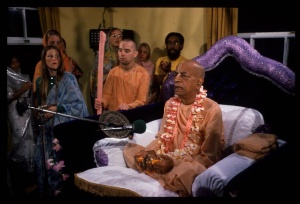SB 10.70.6: Difference between revisions
m (1 revision(s)) |
No edit summary |
||
| Line 1: | Line 1: | ||
{{info | {{info | ||
|speaker= | |speaker=Śukadeva Gosvāmī | ||
|listener=King | |listener=King Parīkṣit | ||
}} | }} | ||
[[Category:Srimad-Bhagavatam - Canto 10 Chapter 70|s06]] | |||
[[Category:Bhagavatam Verses Spoken by Sukadeva Gosvami - Vanisource|107006]] | |||
<div style="float:left">'''[[Srimad-Bhagavatam]] - [[SB 10|Tenth Canto]] - [[SB 10.70: Lord Krsna's Daily Activities|Chapter 70: Lord Kṛṣṇa's Daily Activities]]'''</div> | |||
<div style="float:right">[[File:Go-previous.png|link=SB 10.70.4-5]] '''[[SB 10.70.4-5]] - [[SB 10.70.7-9]]''' [[File:Go-next.png|link=SB 10.70.7-9]]</div> | |||
{{RandomImage}} | |||
{{SBnotice}} | |||
==== TEXT 6 ==== | ==== TEXT 6 ==== | ||
<div | <div class="verse"> | ||
athāpluto 'mbhasy amale yathā-vidhi | :athāpluto 'mbhasy amale yathā-vidhi | ||
kriyā-kalāpaṁ paridhāya vāsasī | :kriyā-kalāpaṁ paridhāya vāsasī | ||
cakāra sandhyopagamādi sattamo | :cakāra sandhyopagamādi sattamo | ||
hutānalo brahma jajāpa vāg-yataḥ | :hutānalo brahma jajāpa vāg-yataḥ | ||
</div> | </div> | ||
| Line 17: | Line 22: | ||
==== SYNONYMS ==== | ==== SYNONYMS ==== | ||
<div | <div class="synonyms"> | ||
''atha''—then; ''āplutaḥ''—having bathed; ''ambhasi''—in water; ''amale''—pure; ''yathā-vidhi''—according to Vedic rules; ''kriyā''—of rituals; ''kalāpam''—the entire sequence; ''paridhāya''—after dressing; ''vāsasī''—in lower and upper garments; ''cakāra''—He executed; ''sandhyā-upagama''—worship at dawn; ''ādi''—and so on; ''sat-tamaḥ''—the most saintly of personalities; ''huta''—having offered oblations; ''analaḥ''—to the sacred fire; ''brahma''—the ''mantra'' of the ''Vedas'' (namely Gāyatrī); ''jajāpa''—He chanted quietly; ''vāk''—speech; ''yataḥ''—controlling. | |||
</div> | </div> | ||
{{SBcollapse}} | |||
==== TRANSLATION ==== | ==== TRANSLATION ==== | ||
<div | <div class="translation"> | ||
That most saintly of personalities would then bathe in sanctified water, dress Himself in lower and upper garments and perform the entire sequence of prescribed rituals, beginning with worship at dawn. After offering oblations into the sacred fire, Lord Kṛṣṇa would silently chant the Gāyatrī mantra. | That most saintly of personalities would then bathe in sanctified water, dress Himself in lower and upper garments and perform the entire sequence of prescribed rituals, beginning with worship at dawn. After offering oblations into the sacred fire, Lord Kṛṣṇa would silently chant the Gāyatrī mantra. | ||
</div> | </div> | ||
| Line 31: | Line 36: | ||
==== PURPORT ==== | ==== PURPORT ==== | ||
<div | <div class="purport"> | ||
Śrīdhara Svāmī points out that since Lord Kṛṣṇa was in the disciplic succession from Kaṇva Muni, He offered oblations to the fire before sunrise. Then He chanted the Gāyatrī mantra. | Śrīdhara Svāmī points out that since Lord Kṛṣṇa was in the disciplic succession from Kaṇva Muni, He offered oblations to the fire before sunrise. Then He chanted the Gāyatrī ''mantra''. | ||
</div> | </div> | ||
__NOTOC__ | </div> | ||
</div> | |||
<div style="float:right">[[File:Go-previous.png|link=SB 10.70.4-5]] '''[[SB 10.70.4-5]] - [[SB 10.70.7-9]]''' [[File:Go-next.png|link=SB 10.70.7-9]]</div> | |||
__NOTOC__ | |||
__NOEDITSECTION__ | |||
Revision as of 03:44, 26 May 2021

A.C. Bhaktivedanta Swami Prabhupada
Please note: The synonyms, translation and purport of this verse were composed by disciples of Śrīla Prabhupāda
TEXT 6
- athāpluto 'mbhasy amale yathā-vidhi
- kriyā-kalāpaṁ paridhāya vāsasī
- cakāra sandhyopagamādi sattamo
- hutānalo brahma jajāpa vāg-yataḥ
SYNONYMS
atha—then; āplutaḥ—having bathed; ambhasi—in water; amale—pure; yathā-vidhi—according to Vedic rules; kriyā—of rituals; kalāpam—the entire sequence; paridhāya—after dressing; vāsasī—in lower and upper garments; cakāra—He executed; sandhyā-upagama—worship at dawn; ādi—and so on; sat-tamaḥ—the most saintly of personalities; huta—having offered oblations; analaḥ—to the sacred fire; brahma—the mantra of the Vedas (namely Gāyatrī); jajāpa—He chanted quietly; vāk—speech; yataḥ—controlling.
Translation and purport composed by disciples of Śrīla Prabhupāda
TRANSLATION
That most saintly of personalities would then bathe in sanctified water, dress Himself in lower and upper garments and perform the entire sequence of prescribed rituals, beginning with worship at dawn. After offering oblations into the sacred fire, Lord Kṛṣṇa would silently chant the Gāyatrī mantra.
PURPORT
Śrīdhara Svāmī points out that since Lord Kṛṣṇa was in the disciplic succession from Kaṇva Muni, He offered oblations to the fire before sunrise. Then He chanted the Gāyatrī mantra.